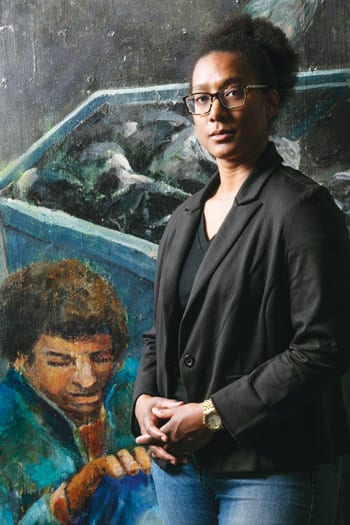
 “I’m doing a different kind of math now,” says DeCarol Davis ’17, who earned a B.S. in electrical engineering from the U.S. Coast Guard Academy in 2008. In her current role as one of four co-directors of the East Bay Workers’ Rights Clinic (WRC), number-crunching constitutes a key part of the legal counseling she provides to unemployed and lowincome workers.
“I’m doing a different kind of math now,” says DeCarol Davis ’17, who earned a B.S. in electrical engineering from the U.S. Coast Guard Academy in 2008. In her current role as one of four co-directors of the East Bay Workers’ Rights Clinic (WRC), number-crunching constitutes a key part of the legal counseling she provides to unemployed and lowincome workers.
“We try to listen to every client’s whole story, to see things they might not,” says Davis, who offers strategies to resolve worker’s compensation, wage discrimination, and wage theft issues. She also confronts broader workplace imbalances such as racial inequality and gender inequity. WRC’s weekly East Bay clinic is one of 16 in the Bay Area run by the Legal Aid Society Employment Law Center (LASELC) that serve about 2,000 clients each year. “The law usually benefits rich or powerful people,” Davis says. “We’re here to look out for those who don’t have a great deal of money or power.”
Davis knows how hard it can be to break through systems in which classism and racism usually prevail—and the difference that allies and good listeners can make. As adept in the classroom as she was on the basketball court, Davis was the Coast Guard Academy’s first-ever Truman Scholar, the only African-American woman in her class, and the 2007 Arthur Ashe, Jr. Female Sports Scholar of the Year. A year later, she became the first African-American valedictorian in Academy history.
After graduating, Davis served as a Coast Guard officer, first as a marine inspector for Sector New York and later as chief of waterways safety in San Francisco. Those experiences continually inform her legal studies. “I can see the various angles—the interests of government, industry, and workers,” she says. “Understanding these perspectives helps me better serve the public.”
Davis got an early taste of successful litigation while still a 1L, when she joined Berkeley Law’s trial advocacy program. Her teams have since won two national championship titles, including last year’s prestigious National Civil Trial Competition. That passion for advocacy was further fueled last summer, when she worked for the LAS-ELC Community Legal Services program and represented clients at unemployment insurance hearings and wage settlement conferences.
Of her efforts with WRC, Davis notes, “My service to workers is linked to my identity and becomes, in essence, an act of self-healing, affirmation, and a form of resistance to those who believe people are voluntarily working poor.” Davis continues to bring her considerable intelligence and strength to challenge the system—and herself.
—KC Trommer